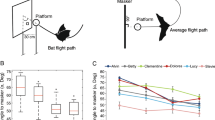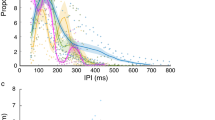Abstract
IN a recent article1 Nordmark fails to explain two features of the bat's ultrasonic transmissions; one is the frequency sweep used by most species of bat employing echo-location as a means of orientation, and the other is the apparent difference between Vespertilionidae and Rhinolophidae which in fact has been shown to be a similarity2. As with all hypotheses related to the behaviour of animals none can be proved beyond doubt, nor can we expect any to be complete; we may, however, assume reasonable efficiency in the use of the information contained in echoes received by the bat as it relies on such information for its very livelihood.
This is a preview of subscription content, access via your institution
Access options
Subscribe to this journal
Receive 51 print issues and online access
$199.00 per year
only $3.90 per issue
Buy this article
- Purchase on Springer Link
- Instant access to full article PDF
Prices may be subject to local taxes which are calculated during checkout
Similar content being viewed by others
References
Nordmark, J., Nature, 188, 1009 (1960).
Pye, J. D., J. Laryngol. and Otol., 74, 718 (1960).
Griffin, D. B., Listening in the Dark (Yale Univ. Press, New Haven, 1958).
Kay, L., Animal Behaviour (to be published).
Author information
Authors and Affiliations
Rights and permissions
About this article
Cite this article
KAY, L. Perception of Distance in Animal Echo-Location. Nature 190, 361–362 (1961). https://doi.org/10.1038/190361a0
Issue Date:
DOI: https://doi.org/10.1038/190361a0
This article is cited by
-
Zur Hypothese des Optimalempfangs bei der Fledermausortung
Journal of Comparative Physiology ? A (1974)
-
On- and off-responses in the inferior colliculus of the Greater Horseshoe bat to pure tones
Zeitschrift f�r Vergleichende Physiologie (1971)
-
Neurophysiologische Untersuchungen zum Echoortungssystem der Gro�en Hufeisennase Rhinolophus ferrum equinum Schreber, 1774
Zeitschrift f�r Vergleichende Physiologie (1970)
-
Die Ultraschall-Ortungslaute der Hufeisen-Flederm�use (Chiroptera-Rhinolophidae) in verschiedenen Orientierungssituationen
Zeitschrift f�r Vergleichende Physiologie (1968)
-
Neurophysiological Investigations of the Bat, Myotis Lucifugus, Stimulated by Frequency Modulated Acoustical Pulse
Nature (1963)
Comments
By submitting a comment you agree to abide by our Terms and Community Guidelines. If you find something abusive or that does not comply with our terms or guidelines please flag it as inappropriate.



